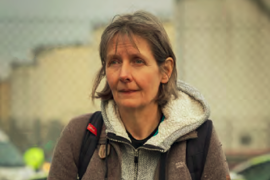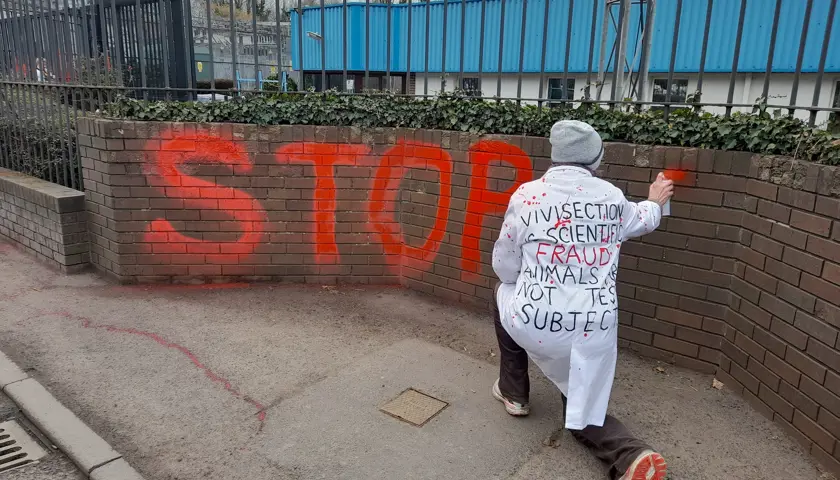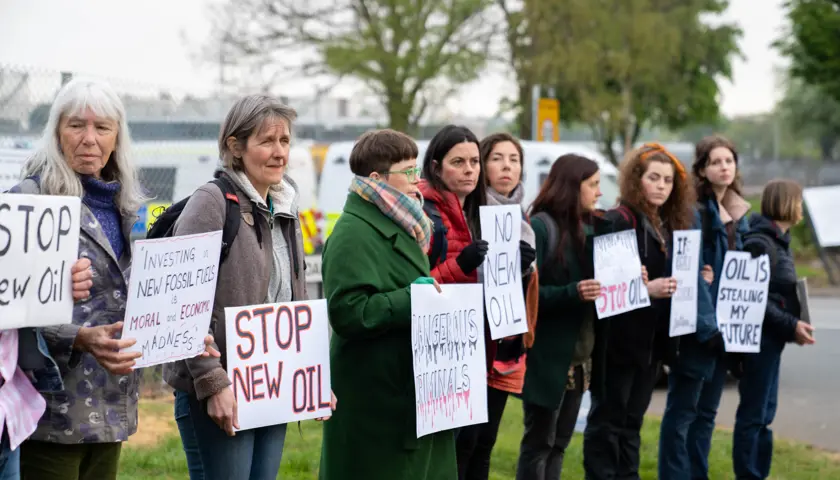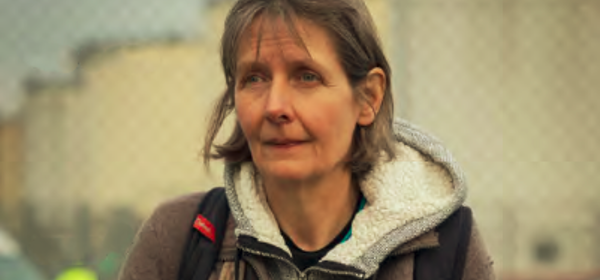
Climate activist doctor Sarah Benn's suspension extended
Tribunal finds retired GP’s fitness to practise ‘remains impaired’
Climate activist doctor Sarah Benn has been suspended from the medical register for a further 12 months.
The Medical Practitioners Tribunal Service ruled that the retired GP’s fitness to practise remains to be ‘impaired’.
That decision was part of a review of the five-month suspension she was given during a 2024 tribunal which found that her breaching of an injunction by peacefully protesting outside an oil terminal calling for an end to new oil amounted to misconduct.
That tribunal had found her fitness to practise was ‘impaired’ because she had spent 32 days in prison for contempt of court, bringing the medical profession into disrepute.
Dr Benn had appealed the outcome of the tribunal at the High Court, which earlier this year upheld the tribunal’s decision.
The review of her suspension was heard alongside details of another protest she was involved in, against testing on animals carried out by research company Sequani in February 2023, for which she was convicted of criminal damage, fined £500 and ordered to take part in community service.
Dr Benn's fitness to practise was also deemed to be 'impaired' because of her conviction for this separate matter.
The tribunal panel said its decision was necessary to promote and maintain public confidence in the medical profession and promote and maintain proper professional standards and conduct for the members of the profession.
No clinical concerns were found in either case, and the tribunal noted her 'previously unblemished career'. Dr Benn retired from clinical practice in 2022.
The tribunal concluded: ‘Her actions, taken as a whole, reflect a sustained pattern of unlawful behaviour. This pattern suggests that Dr Benn believes she can selectively choose which laws to follow.
‘A reasonable, well-informed member of the public, as well as her professional peers, would not necessarily share this view. In this context, her behaviour falls significantly outside the accepted standards and norms of the profession.’
The tribunal also said that Dr Benn has given ‘minimal consideration of remediation’ so there ‘remained a risk of repetition of the misconduct and offending’ and ‘therefore, a finding of impairment was necessary in the public interest and to uphold professional standards’.
It said that Dr Benn 'does not accept that she has done anything wrong', has 'not properly reflected on and acknowledged her misconduct' and has 'not made any attempt to remediate'.
This, the tribunal concluded, 'showed a repeated and deliberate failure to adhere to the standards set out in GMP (Good Medical Practice)' and means that 'there remains a significant risk of repetition'.
The panel considered whether to strike Dr Benn from the medical register, but decided that would be 'disproportionate' and 'not appropriate' because 'her conviction and misconduct were not fundamentally incompatible with continued registration'.
‘Planet is dying’
On receiving the decision, Dr Benn said: 'The MPTS has chosen, again, to kick the can down the road for someone else to deal with, when the climate emergency has likely worsened even further.
'I am thoroughly weary of this process, which has been going on for years, and I am not minded to engage any further with it.
'This is not about me. This is about yet another missed opportunity for medical institutions to show some leadership in addressing the urgency of emergency action on climate breakdown.
'It’s just not enough to have declared an emergency, if one is serious about protecting life and health. Subsequent action should look like it’s an emergency, not a slight potential interference with business as usual that can be tackled at leisure.
'As cascading risks increase with temperature, medical supply chains and infrastructure will collapse, delivering any kind of care will become impossible. Public trust in doctors and our ability to protect patients and uphold our reputation will be non-existent.
'Our planet is dying, the clinical signs are right there and being documented in the notes, but not being acted upon. If the Earth is a patient, depending on timely medical intervention, right now they’ve got acute sepsis, are going downhill fast, but are being given a Paracetamol and being told that the doctor will check up on them tomorrow morning.
'The medical establishment could and should do better.'
Animal testing protest
Dr Benn told the tribunal she had held strong objections to testing on animals since her childhood, and that it makes her ‘feel physically sick’.
Since retiring from clinical practise in 2022, she said she had done more research on the issue and found practices she disagrees with are still widespread.
Dr Benn recalled the 32 days she spent in prison for her climate activism, saying the ‘physical confinement’ she endured was the ‘most difficult part’.
She compared this to the ‘similar way’ some animals are confined, with this existence ‘punctuated only by unpleasant and often painful procedures inflicted by humans.’
Evidence submitted by Dr Benn included examples of Beagle puppies being bred to be sent to a testing facility. She said her family had adopted two dogs from Korea, helping save them from being butchered for the dog meat trade.
‘Attention grabbing protest’
Moving to her actions of February 2023, she said she had joined what had been a regular protest for a national coordinated day of action intended as an ‘attention grabbing protest’ that was ‘entirely legal’.
She admitted how she and three others sprayed red chalk on a metal gate at Sequani Ltd saying ‘STOP THIS’ and ‘STOP’. This was ‘in full view’, with ‘no attempt to obscure identities’, making them ‘fully accountable’ for their actions, she said.
Dr Benn reflected on the effectiveness of the action, saying she ‘regrets’ it now because it did not lead to raising meaningful awareness of the issue of animal experimentation. She said she still campaigns on the issue, such as speaking in schools and writing to her MP.
She said she had not mentioned her profession when undertaking the animal welfare protest, contrasting this to how she did during her climate activism because ‘the climate emergency is also a health emergency’, which she said makes it directly relevant.
Arguing she should not be sanctioned, Dr Benn pointed to a 2019 GMC study which found a majority of respondents believe the regulator should go no further than a warning for doctors who break the law in two examples; stealing gloves worth £10, and punching a person during a fight in a nightclub.
On cross examination, Adam Lodge, representing the GMC, asked Dr Benn if she would continue breaking the law to campaign against animal testing if it would garner more attention.
She said she doesn’t expect such an opportunity to arise, and if it did she would ‘have to think very carefully’.
Moving to the review of her existing suspension for the 2024 misconduct finding for breaching a court order when taking part in climate activism, Dr Benn submitted four positive character statements, 11 emails in support of her sent to the GMC, a petition calling for her suspension to be reversed, a letter of support from BMA council chair Phil Banfield, and the GMC’s response linking to its net zero plan, which she described as ‘frankly risible’.
She also presented support from bodies including The Doctor’s Association UK (DAUK) and UK Health Alliance on Climate Change, as well as a paper showing the public were ‘broadly supportive’ of healthcare workers taking a stance on the climate.
She said the GMC had given just one example of an opposing view in response, an opinion piece by one journalist writing for the Times.
Reflecting on her actions a year on from her suspension, Dr Benn noted it had been the hottest year on record and pointed to natural disasters caused by climate change such as glaciers collapsing in Switzerland, record floods in India, wildfires in California and lethal floods in Spain. ‘These are not blips,’ she said. ‘The global climate is unravelling.’
Dr Benn also reiterated her stance from the previous tribunal, that non-violent direct action has historically led to change. She gave the specific example of the Suffragettes, whose actions are now celebrated but were illegal at the time.
Being told the climate crisis is her ‘sincere belief’ and ‘deeply held conviction’ made her feel ‘dismissed’ because she was basing her views on scientific facts, not opinion, Dr Benn added.
She contrasted this to a hypothetical situation where a doctor was protesting as part of the anti-vaccination movement, which is not supported by science.
While Just Stop Oil, the organisation she had protested with, has disbanded having achieved its goal of no new oil and gas becoming UK government policy, Dr Benn said ‘the situation remains dire’.
For this reason, she said she will continue to take non-violent direct action, which ‘may well involve breaking the law’, but only if necessary: ‘I don’t want to break the law, but handing out leaflets, writing to my MP and signing petitions isn’t effective.’
A ‘special case’
Dr Benn told the tribunal she had been prepared to join a protest outside parliament earlier this year, which may have risked her being arrested, before it was called off.
‘When an opportunity arises which I think has a chance of forcing the narrative, then I will be there’, she said. ‘Even if it involves breaking the law by breaching an injunction.’
‘If this stance is seen as a lack of insight on my part, then so be it. I see it as a lack of insight on the part of those who make such judgements’.
Mr Lodge, for the GMC, submitted that Dr Benn relied on her profession to advance her cause, suggesting this goes against the GMC’s Good Medical Practice guidelines.
She replied to say using her profession is relevant because ‘the climate emergency is also a health emergency’, adding that it was also pragmatic because she receives more media interest in her views as a doctor than activists with other professions.
Mr Lodge asked if it would undermine trust in the profession if doctors generally felt they could disregard the law for a cause they believed in.
Dr Benn said it would be ‘idiotic’ to suggest doctors could disregard the law for any belief, but said the climate crisis is a ‘special case’ because it affects all life on Earth and therefore her actions were ‘justified’. ‘I do not think it is OK to just break the law for convenience or personal gain, or other causes,’ she explained.
When pushed on where to draw the line on when to take action that breaks the law, Dr Benn said ‘it’s about why’.
‘I’m not setting out to break the law for any other reason than my conscience and my desperation to do something about this urgent situation,’ she told the tribunal. ‘If there becomes a way to do something that is likely to get something happening that does not involve breaking the law, I’m 100% up for that. Breaking the law is not the end in itself. It’s the ability to take disruptive but non-violent action to bring change.’
The tribunal asked Dr Benn whether she felt her non-violent actions might encourage others to take the same message further, and act violently.
She said that was ‘a huge leap to make’ and that she hoped it would instead encourage others to take peaceful, non-violent direct action.
Dr Benn was asked why other colleagues who backed the same cause have not gone as far as breaking the law.
She said she was ‘lucky’ in that she has retired from clinical practise and has paid off her mortgage, meaning the consequences for her are ‘more straightforward’ than they would be for doctors earlier in their careers.
She also noted that other doctors, including fellow retired GP Diana Warner, and active GP Patrick Hart, have faced prison sentences for convictions relating to their climate action, while other doctors have been put on trial for their actions.
‘Unjust’ court order
Tribunal chair Julia Oakford asked Dr Benn if she has respect for orders made by the court, given she has breached them in the past.
Dr Benn said ‘it depends on the court order’. She said the injunction placed on her regarding Kingsbury Oil Terminal was ‘completely unjust’, to benefit a private company making money by ‘destroying the planet’ so she has ‘no problem breaching that’.
She said being suspended from the medical register ‘still stings a lot’ despite being retired from clinical practice.
Mr Lodge asked if Dr Benn will always hold her views, including on how to take action, to which she replied: ‘I can’t see my views changing unless something radically shifts.’
‘If tomorrow there was an opportunity for something entirely legal, didn’t have consequences and had a chance of success, I would be there. But there just isn’t.’
‘Pattern of behaviour’
Mr Lodge submitted that the animal welfare and climate protests should not be looked at in isolation. That they took place five months apart, he said, shows a ‘pattern of behaviour’ which was an ‘aggravating feature’.
‘The doctor deliberately breaches the law to further a cause she believes strongly in,’ he said.
Mr Lodge said evidence suggested Dr Benn accepted there was ‘no justification’ for her actions relating to the animal experimentation protest and that she said she ‘regrets’ those actions.
He said that could be interpreted as ‘little chance of repetition’ but could also be seen as ‘a continuation’ of her activism for relating to the climate protest.
He submitted that not finding her fitness to practise is impaired ‘would undermine public trust’ in the profession.
In her submissions, Dr Benn said the animal testing protest was ‘carefully planned’ and non-violent, resulting in a ‘trivial amount of damage to a company’. She said she pleaded guilty at the earliest opportunity and did not link the action to her profession as a doctor.
She said that while some people may frame her actions as ‘serial criminality’ by someone with a ‘reckless disregard for the law’ she would argue otherwise, and said she will only take part in animal rights campaigning within the law from now on.
She noted: ‘The public does not automatically expect the GMC to have involvement where a doctor commits a criminal offence outside of the workplace’ but that the most important thing appears to be whether the doctor harmed anyone, which she didn’t.
Mr Lodge said: ‘This hearing is not about climate change or attitudes towards climate change, it is not concerned with an individual’s right to engage in peaceful protest, even vigorous protests. It is about Dr Benn using her role as a member of the medical profession to advance those views’.
Mr Lodge submitted that surveys and petitions should not be taken as representative of the wider public’s views. And he said that by repeatedly breaching the law, with no evidence of remediation, is ‘incompatible’ with her position as a member of the medical profession.
Dr Benn told the hearing: ‘My case is that my fitness to practise never was impaired’. She said the questioning she had received was trying to suggest she felt herself above the law. ‘I don’t,’ she said.
Dr Benn said there is ‘tension’ between the three parts of ongoing risk assessment in the GMC’s Good Medical Practice guidelines, in her case.
She said she acted ‘because the safety of patients, the safety of the whole of humanity is seriously and increasingly compromised by the unfolding of the climate emergency’ and urgent action ‘is just not happening’.
This, she said, ‘does not constitute impairment of my fitness to practise’.
Dr Benn also questioned the idea put forward by the GMC that a doctor being convicted, for whatever reason, undermines public trust in the profession.
She said ‘things change’ over time, noting how doctors have previously been brought before tribunal for offences related to homosexuality – something for which the GMC has since apologised.
In summary, she concluded: ‘I simply do not agree that my actions at Kingsbury Oil Terminal in 2022 amounted to misconduct serious enough to impair my fitness to practise in April 2024 and therefore I do not believe it is currently impaired by any such misconduct.’




